
How fatal to the collation and announcement of election results, is the non-transmission of accreditation and election results through BVAS directly from the polling units?
By Olufemi Oniyide
The 2023 General Elections has virtually come and gone, but it’s legal reverberations and political cacophony is still very much with us. It’s still very much with us because many believe that INEC did not do a good job enough, while many also, at the same time, believe that the Commission performed a superb job. This article will be very direct and precise in looking at the Sections of the Electoral Act of 2022 and the INEC Manual for Election Officials, 2023, that deal with the transmitting of voters accreditation and election results from the Polling Units to the point of collation and announcement of election results from the Ward level, to the local government, to the State Constituency and right up to the State and Presidential Election level.
The grundnorm on which the collation and announcement of election results by Collation Officers or Returning Officers’ stands, is the announcement made, recorded and transmitted by the Presiding Officer at the Polling Unit level from each of the 176,606 Polling Units cutting across the 36 States and the Federal Capital Territory of Nigeria.
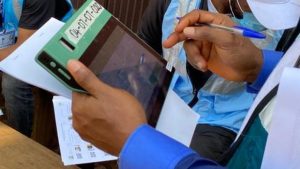
This article will strictly give a literal interpretation of the Electoral Act, 2022 and the INEC Manual for Election Officials,2023 in a manner that anyone who understands the English language can understand. I will very much do away with bothering us with too much legalese or any judicial precedent bombardments. The explanation here will be in plain terms and language except where it is diligently necessary to do otherwise, in order that the reader can have a solid grasp of what is being discussed. I believe that the language of the Electoral Act is in itself simple and easy to understand.
First, I have heard many, including senior lawyers, argue that the transmitting of election results through BVAS from the polling unit is not expressly stated in the Electoral Act of 2022, but I beg to humbly disagree with this submission. Why? Section 47 (2) of the Electoral Act states that, “To vote, the Presiding Officer shall use a ‘smart card reader’ or any other technological device that may be prescribed by the Commission, *for the accreditation of voters”.* I do humbly submit that the Bimodal Voter Accreditation System machine, shortened as BVAS, is nothing but a smart card reader and a technological device that does the work of accrediting voters and transmitting such accreditation and election results announced by the Presiding Officer to the INEC IReV Portal or Collation System from the polling units where voting are held. Therefore, the Electoral Act guarantees the place of a smart card reader in the 2023 general elections and any argument to the contrary is not tenable by virtue of Section 47 (2) of the Electoral Act.

Then, let’s move on to whether the Act provides for transmission of accreditation and election results from the polling units. But, before then, let’s note that the INEC Manual for Election Officials is also guaranteed a space in the elections as it deals with guidelines for the elections. Section 60 (5) of the Act provides that, “The Presiding Officer *shall transfer* the results including *total number of accredited voters and the results of the ballot* in a manner as prescribed by the Commission.” The Electoral Act in so many of it’s sections referred us to the “manner prescribed by the Commission”, which in simple terms is the INEC Manual for Election Officials, 2023. In order to drive home the importance of Section 60 (5); Section 60 (6) makes a contravention of that section of the Act, by a Presiding Officer, a criminal offence with a liability on conviction, to a fine of N500,000:00 or an imprisonment term of 6 months. So, the next question is whether the Commission, that is INEC, has prescribed a procedure for the transmission of election results from the polling units? The answer to this is in the affirmative, by virtue of the INEC Manual for Election Officials, 2023, which is an offshoot of the powers given to INEC by various sections of the Electoral Act 2022, as aforementioned. That is, the INEC Manual for Election Officials, especially the part dealing with transmission, transfer, scanning or photocopy of election results from polling units to the Collation System of INEC, which is represented by the IReV Portal as stated in the manual. I have stated from the beginning that this article will make things so elementary, that even non-lawyers, seeking for the unambiguous interpretation of the Electoral Act of 2022 and it’s hand maiden, that is, the Manual for Election Officials 2023, can decipher and understand what the law expects from INEC and it’s officials as unbiased umpires of the 2023 General Elections.
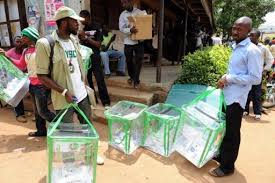
The introductory to *Section 2.9.0* of the Manual for Election Officials, captioned: ‘Electronic Transmission/Upload of Election Result and Publishing to the INEC Result Viewing (IReV) Portal’; states the reason why BVAS (a smart card reader and technological device) introduced by Section 47 (2) of the Electoral Act,2022, is so important due to the fact that; *”one of the problems noticed in the electoral process is the irregularities that take place between the polling units after the announcement of results and the point of result collation. Sometimes results are hijacked, exchanged, or even destroyed at the polling unit or on the way to the Collation Centers. It becomes necessary to apply technology to transmit the data from the polling units such that the results are collated up to the point of result declaration. the real-time publishing of polling unit-level results on irev portal and transmission of results using the BVAS demonstrates INEC’s commitment to transparency in result management (emphasis mine). The commitment is backed by sections 47 (2), 60 (1),(2)& (5), 64 (4a) & (4b) and 64 (5) of the electoral act, 2022, which confers INEC with the power to transmit election results electronically.
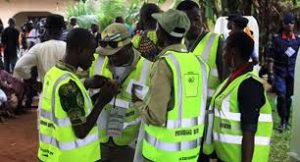
The system minimises human errors and delays in results collation and improves the accuracy, transparency, and credibility of the result collation process.”* Without any further interpretation, the reason for the introduction of BVAS and the uploading or transmitting or transfer of election results at polling units real-time by Presiding Officers, after announcement, is hereby made very clear by the Manual. What we need put in mind is that this part of the Manual is supposed to be ingrained as an integral part of the Electoral Act, though some argue that INEC Guidelines do not have the same weight as the Act. I will come back to this argument later in the course of this article.
For now, let’s explore the procedure at the polling unit after the completion of voting by the electorates. Section 60 of the Electoral Act gives a step by step procedure to follow by the Presiding Officer at the Polling Unit from the counting of votes up to the point of declaration and transfer/transmitting of election results by BVAS (or call it card reader if you like) to the Irev portal or collation system of INEC.
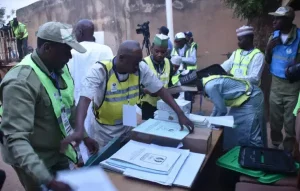
Towards the end of the steps to follow by the Presiding Officer, ‘Section 60 (4)’ states that, the Presiding Officer “shall count and announce the result at the polling unit” and Section 60 (5) states that, “the Presiding Officer shall transfer the results including total number of accredited voters and the results of the ballot in a manner as prescribed by the Commission”*. The prescribed manner by which this “transfer” will take place is stated by INEC in *Section 2.9.1 of the Manual for Election Officials, where it states in the headline: “Using the BVAS for Uploading Election Results.* To scan/photograph, and upload the polling unit election result, where there is network, the Presiding Officer shall follow the steps below…. (the manual gives a detailed step).Then *Section 2.9.2 of the Manual* speaks to “Offline Transmission of Results. The e-transmission application has been updated to work offline, when and where there is no network”. So, the Manual gives a detailed account of the steps to take by Presiding Officers whether there’s network or no network. No room for errors in uploading any election result whether in the forest of Zamfara or the plains of Umuahia or in the swamp of Bayelsa or within the towering bricks of Lekki in Lagos; just upload to INEC IReV because every Presiding Officer can do so, except the one who decides not to do or situations where the BVAS or card reader has been destroyed.
‘Section 3.4.4 of the Manual’ goes further to state under the headline; “COUNTING AND RECORDING OF VOTES”, that, “Immediately after sorting of ballots, the Presiding Officer shall… Step 6: Cross check the scores of the candidates/parties and The Presiding Officer SHALL then: ……
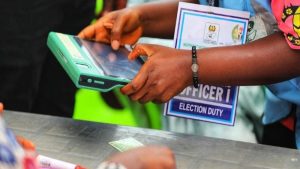
Transmit the election results electronically to the collation system as prescribed in the Regulations and Guidelines for the Conduct of Elections 2022″. It’s important, before moving to the next Step, to look at what the Regulations of 2022 referred to above says. It states in its Section 38 that: “On completion of all the polling unit voting and results procedures, the Presiding Officer shall: (i) Electronically transmit or transfer the result of the polling unit, direct to the collation system. (ii) Use the BVAS to upload a scanned copy of the EC8A to the INEC result viewing portal (IReV), as prescribed by the Commission.”
STEP 12 under the same Section 3.4.4 of the INEC Manual of 2023 further states that the Presiding Officer shall, “Use the BVAS to scan/take a picture of the completed, signed, stamped and dated Form EC8A for polling units where election was held….”, and in STEP 13 thereby states that, the Presiding Officer shall then, “Upload the scanned copy of the Form EC8A for polling units where elections are held…..to the INEC IReV as prescribed by the Commission”.
The mode of uploading form EC8A as prescribed by the Commission is as aforementioned in Section 2.9.0 of the 2023 Manual of INEC. All the sections of the Electoral Act and the Manual quoted above points to the fact that the Presiding Officer at each Polling Unit shall make sure that the election results are recorded in the INEC prescribed Form EC8A and the result so filled in the form is transferred or transmitted real-time from the polling unit as prescribed by INEC in the Manual.
It should be clearly noted that the platform or grundnorm or pillar, on which any election result collation and announcement by a Collation Officer or Returning Officer stands, be it that of the House of Assembly or the Governorship or the Presidential Election, is the accreditation of voters and result as announced by the Presiding Officer at the polling unit, of which such election result shall be recorded and transmitted by the Presiding Officer through the BVAS or smart card reader.

The next question to ask is how can this be? The answer to this takes root from ‘Section 64 (4a) & (4b) of the Electoral Act.’ Section 64 (4) of the Act states that, “A Collation Officer or Returning Officer at an election shall collate and announce the result of an election, ‘SUBJECT to his or her verification and confirmation that the – (a) number of accredited voters stated on the collated result are correct and consistent with the number of accredited voters recorded and transmitted directly from polling units under Section 47 (2) of this Act” So, what is Section 47 (2) about?
The subsection is as to the grounding of the law that a “smart card reader or any other technological device that may be prescribed by the Commission” must as of every necessity be used to accredit a voter at any of the polling units. So, as the BVAS is the “smart card reader and technological device” introduced by INEC, then, non-use of BVAS at any polling unit renders the election at such polling unit inconsequential in accordance with Section 47 (3) of the Electoral Act. ‘Section 64 (4)(b)’ is the next leg of what a Collation Officer or Returning Officer must do before collating or announcing the result, it states that he or she shall make sure that “the votes stated on the collated result are correct and consistent with the votes or results recorded and transmitted directly from the polling units under Section 60 (4) of this Act”
Section 60 (4) of the Electoral Act states that the Presiding Officer at the polling unit “shall count and announce the result at the polling unit” The combined effect of Section 47(2), 60 (4) and 64(4)(a)&(b), is that the card reader (BVAS) shall be used to accredit voters and the number of accredited voters and election result announced by the Presiding Officer at the polling unit shall be recorded in the prescribed form EC8A and transmitted to the IReV from the polling unit. One may conveniently ask that which section of the Electoral Act speaks to transmission of results from the polling unit, if one goes by the aforementioned argument that the INEC Manual or guidelines does not carry the force of the law as the Electoral Act itself ?

The simple answer to this is also in Section 64(4)(a)&(b) of the Electoral Act as abovementioned. The section admits the authority and power of the Collation Officer or Returning Officer, at any stage of the collation of results to collate and announce results but with the proviso or condition precedent that such Collation Officer or Returning Officer shall make sure that such collated result to be announced by him shall be “correct and consistent” with the number of accredited voters recorded and transmitted by the Presiding Officer through the smart card reader (BVAS) “directly from the polling unit”.
That is, the results to be so collated and announced by the Returning Officer must also be the one announced by the Presiding Officer at the polling unit. Therefore, even without the INEC Manual for Election Officials 2023, the Electoral Act 2022, is crystal clear that accreditation of voters and election results must be transmitted directly from the polling units. The Act does not need the assistance of the INEC Manual in order to hammer home and understand this very germaine issue.
It is a fact that collation of results’ starts with the Presiding Officer at the Polling Unit level and the Act places the burden of transferring, transmitting, scanning or photocopying the form EC8A, which is the prescribed form on which election results are recorded, to the collation system or IReV Portal of INEC directly from the polling unit. So, Section 64(4) (a) & (b) of the Electoral Act is speaking to all Collation Officers or Returning Officers of INEC, from the Ward-level collation center to the highest of the Collation Centers, depending on what election one is speaking to, that such Collation Officer or Returning Officer must make sure that the election result he or she is collating or announcing is “correct and consistent with the votes or results recorded and transmitted directly from polling units”.
The million dollar question then arises, whether a Collation Officer or Returning Officer, from the Ward level to the Governorship or Presidential election result collation or announcement level, collate and announce a valid result without any transmission of the accreditation of voters and election results from the card reader or BVAS to the IReV or Collation System of INEC ? That is, can a ward level collation officer collate and announce any result when the Presiding Officer at the polling units under his ward have not transmitted any result on or from the Card Reader?

The simple, unambiguous answer that can be generated from the various sections of the Electoral Act as severally quoted above, in this piece is, No. Or rather asked in another form; Can a collation officer or Returning Officer for an House of Assembly, House of Representatives, Senatorial, Governorship or Presidential election, collate and announce any result when he or she expressly knows that no accreditation of voters or election result has been transmitted or transferred from the polling units to the collation system or IReV Portal of INEC? The answer is No. Or, can a Collation Officer or Returning Officer collate or announce results without checking whether accreditation of voters or election results have been transmitted by the Presiding Officer directly from the polling unit ? The specific answer to the above is still, NO.
I do humbly submit that, looking strictly and interpreting without any ambiguity, the various sections of the Electoral Act, 2022, without even taking cognisance of the INEC Manual for Election Officials, 2023; the platform by which any election result can stand are two fold, that is, the accreditation of voters and election result as recorded in Form EC8A and transmitted by means of the Card Reader called BVAS, from the polling unit, by each Presiding Officer.
That is, the Form EC8A and the transmitted result through BVAS are the only valid means for any collation and announcement of election results by a Returning Officer to be valid. Any means not alligning with the two at a go, is void and an invalid collation and any announcement of election results from such should also be invalid, moreso, when one condition is meant to uphold the other, that is, the prescribed Form EC8A is made to uphold the transmitted result from the BVAS, while the transmitted result from the BVAS is paramount in order to uphold the recorded result in Form EC8A.
The Electoral validity bird of the election is meant to fly with two wings and the inability of one wing out of the two to function is fatal to the ability of the bird to fly. ‘In short, the validity of an election result is dependent on whether the Collation Officer or Returning Officer at the Ward level had the opportunity to juxtapose the correctness and consistency of the accredited voters and election results he is collating or announcing to the accredited voters and election results transmitted from the polling units level by the Presiding Officers through the Card Reader.

Something cannot stand on nothing. The platform or ground level on which all collations from the ward level upwards, stands is the polling unit level accreditation of voters and election results transmitted directly from the polling unit and if it fails the test of correctness and consistency, it cannot stand or be valid. Wherever it is proved that the Returning Officer at the Ward level did not have the opportunity of “verification and confirmation” of the correctness and consistency of the polling unit election result through the juxtaposition of the result in Form EC8A with the transmitted result on the Card Reader or BVAS, then it stands to be argued that any election result collated and announced thereby is totally invalid*
This piece is mainly to give the reader an opportunity of a deep peep into the jurisprudence of our Electoral Act, 2022.
Oniyide Olufemi is a Nigerian legal practitioner who resident in Ogun State and can be reach on thelawgreat@yahoo.com
FOOTNOTE: You want to share story with us? You want to advertise with us? You need publicity for product, or service, or event? Contact us on WhatsApp +2348073463653 or email penpushing@yahoo.com






